What a fantastic week it’s been for our Our November to Remember series of guest lectures series.
This week has seen two more great speakers, you can watch them below and catch up with all of them from our official YouTube channel:
Deep thoughts from the Centre for Applied Computer Science @ The University of Bolton
What a fantastic week it’s been for our Our November to Remember series of guest lectures series.
This week has seen two more great speakers, you can watch them below and catch up with all of them from our official YouTube channel:
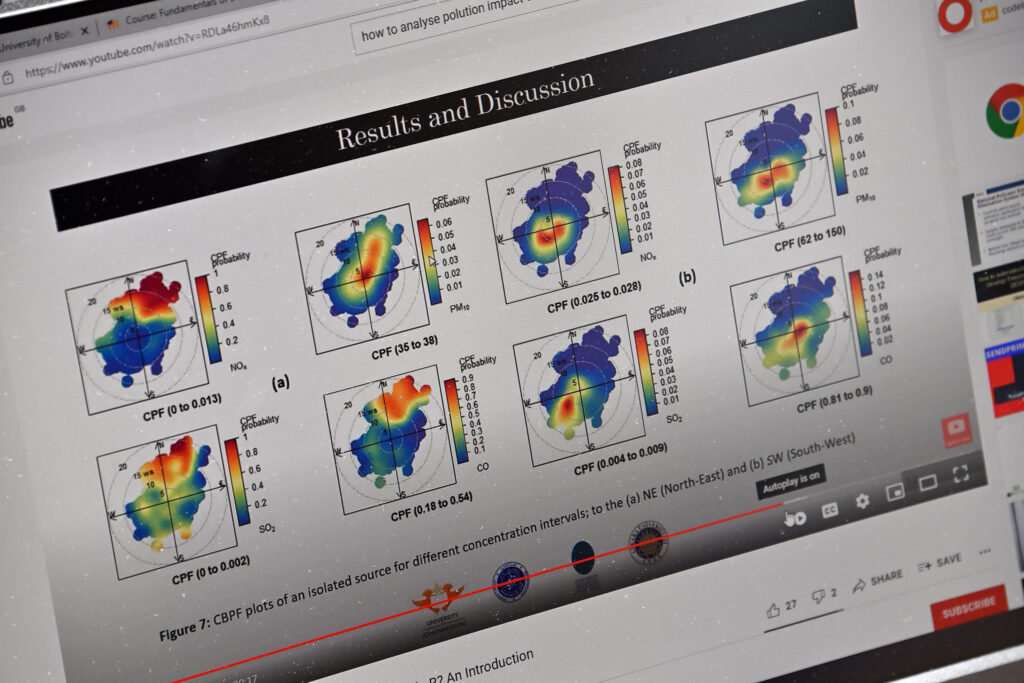
What a busy and exciting week it’s been!
This week saw our inaugural annual Bolton data hackathon as students from our computing degrees organised themselves into teams to rise to the challenge thrown down to them by our friends at Bolton Council: discover something new relating to the local environment by “digging deep” into complex open data sets to truly turn data into meaningful and insightful information.

Students at all levels, from first-year undergraduates to postgraduates, set to work over the two-day event to sift, sort, shape, examine and explore a variety of complex datasets during what proved to be an enlightening, challenging and entertaining event for everyone.

7 teams presented their conclusions and the members of the top 3 teams who were judged as having produced the best outcomes, were awarded £50 Amazon gift vouchers each.
But not only were cash prizes up for grabs, the top-scoring team’s lucky members also get the opportunity of several work experience days at Bolton Council to learn more about how computing shapes and supports what the council does in many different ways.
The winning teams were:
1st Place – Team Mountain (Nathan Barron, Ike Igweze, Umara Akhtar, Ash-Lee Ashton, Nitesh Pandit)
2nd Place – Team Ctrl Alt Delete ( Josh Price, Alison McCaughtrie)
3rd Place – Team Data Miners (Isa Hussain, Faizaan Mohmed, Subodh Shah, Anis Patel, Abimbola Abatan-Balagun)
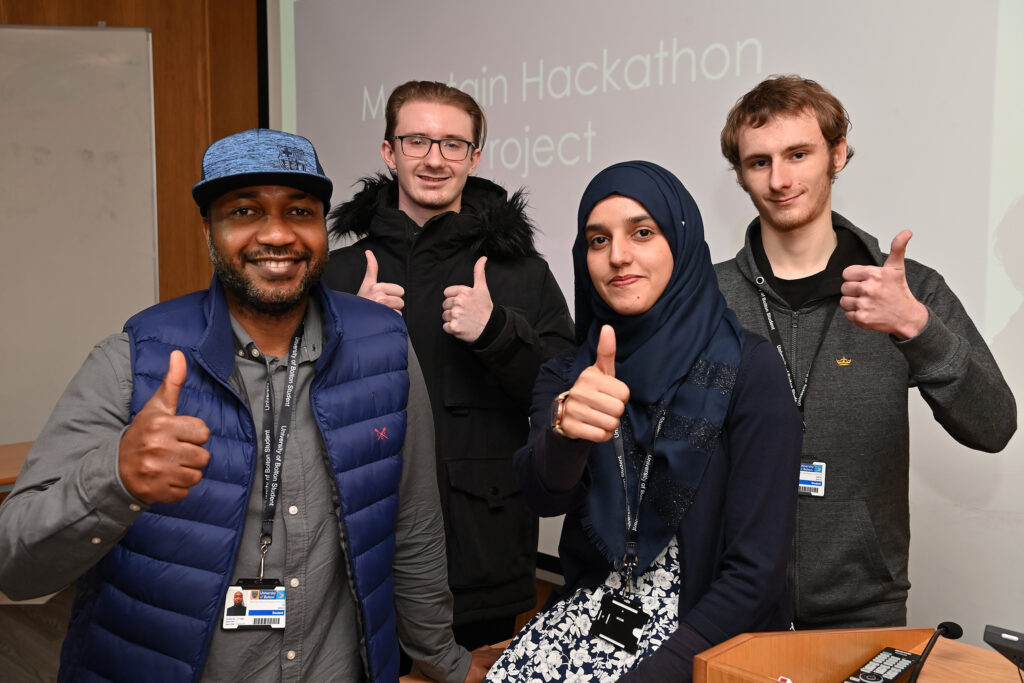
Well done to them and to everyone who took part!
This is a great outcome and shows once again that The University of Bolton truly has a focus on graduate employability as those experience days will greatly add to their CVs and give them valuable insight into the working world and the work of local councils.
Thanks again to the amazing people at Bolton Council and Data Mill North who helped us to make this possible, we look forward to seeing you again in 2022!
Who knows what the theme will be next year, but one thing’s for certain: our students will love taking part!
Can they dig it? Yes, they can! 😉
What a fantastic week it’s been for our Our November to Remember series of guest lectures series.
This week has seen two more great speakers, you can watch them below and catch up with all of them from our official YouTube channel:
Welcome dear reader.
As the darker, longer nights draw in, are you in need of something different to grab your interest and keep you engaged this November?
Quite possibly yes I’d have thought!
Well then, look no further! Our November to Remember series of guest lectures has gotten off to a flying start last week!
If you weren’t able to catch them live, fear not, you can catch up via our official YouTube channel, onto which we’ve just uploaded the first two lecture recordings from last week:
Prepare to be inspired and enthralled this November with our “November to Remember” series of guest lectures!
We have an exciting line-up of guest speakers to bring you engaging and thought-provoking lectures that bring business literacy, employability skills and research methods to life in the context of Computing:
All lectures are delivered online, with recordings available soon after on our official YouTube channel.
Lecture Schedule:
| Date In November | Speaker | Topic | ||
| 1st | Jane Egerton-Idehen, Facebook’s Head Of Sales, Middle East & Africa | Career Nuggets-Employability | ||
| 2nd | Paul Hollins, PhD MSC MBA FCybS Cultural Research Development Arts & Management University Bolton | Viable Systems Model: Cybernetics Research | ||
| 8th | Christopher Agbamuche, Vice President bank of America. USA | Business creativity and Innovation | ||
| 9th | Thippa Reddy Gadekallu, Associate Professor Grade 1 Department of Information Technology. Senior Member, IEEE Vellore Institute of Technology, Indian | Research and Publication Experiences | ||
| 15th | Chidinma Maduka Talent Management Leader | Global Competency Development and Career Management Expert | Driving HR Tech Change Projects, that Deliver Succession Plans and Ensure Sustainable Business Operations | Winning CV and Business Growth | ||
| 16th | Dr. Eng. Christos P. Antonopoulos, Assistant Professor University of Peloponnese Electrical & Computer Engineering Department, University of Peloponnese, Patra, Greece | Internet of Things: End-to-End Research Overview. The Ambient Assisted Living Environment | ||
| 22nd | Mohammed M. Alani Professor of Cybersecurity, School of Information Technology Administration and Security, Seneca College of Applied Arts and Technology, Toronto, Canada. | Forensic Analysis and Preventing Cyberattacks in Organisation | ||
| 23rd | Prof.(Dr.) Sandeep Kautish, Dean-Academics LBEF Campus, Kathmandu (Nepal) | Research Collaborations | ||
| 30th | Dr Celestine Iwendi, Senior Lecturer, Centre for Applied Computer Science, The University of Bolton | The Secret To Academic Research Excellence |
All lectures start at 6pm and are free to join with the Zoom details given below:
Zoom URL: https://bolton.zoom.us/j/3559164017?pwd=SzRoMDFPNUllNHUrbzNxMGgy
Password: UEU3UT09
We hope to see you there!
The Centre for Applied Computer Science has been a Cisco Academy for fifteen years. We have incorporated the Cisco Certified Network Associate (CCNA) curriculum into our BSc Computer Networks and Security course since we created it. CCNA is a qualification that employers really value. We believe that having a CCNA as well as a degree when you go to an interview gives you an advantage over other candidates.
Vendor certifications are part of our commitment to make our degrees relevant to the modern workplace. Our graduates tell us that CCNA, Windows and Linux experience all help to make them more employable.

We have incorporated material from the Red Hat Academy into the most recent version of Computer Networks and Security. Students study the syllabus for the Red Hat Certified System Administrator qualification.
Both Cisco and Red Hat are major brands in Computing and Networking. Belonging to their academies gives you a head start in your career.
Our latest program embraces Cloud technology. We have joined the Amazon Web Services: AWS Educate programme. This allows our students to use Amazon’s powerful cloud infrastructure in class and to pursue your own interests outside the classroom. AWS give students credits to use this world-class infrastructure and learn modern cloud computing techniques.

Students often ask which programming languages we teach with at the University of Bolton and why we chose them.
On our Software Engineering and Computing degrees, we use a range of popular languages but the decision as to which to use is not as straightforward as you might think!
As a newcomer to the computing lecturing ranks at Bolton and straight out of 20 years in industry as a programmer, I thought I’d blog an answer to these questions…
At heart, the reason anyone programs a computer to do anything is to produce a solution to a problem. Thus, all programming languages are just tools, a means to an end. So that would mean lecturers should just teach with whatever language they prefer then, right? Wrong!
We currently teach with three main “general-purpose” languages: Java, Python and C# along with “web languages” such as JavaScript, PHP and Bash shell scripting and the ubiquitous SQL of the database world. But the rationale for this selection goes beyond that of being personal preference on the part of lecturers. Yes, the University is Teaching Intensive, Research Informed but it’s also concerned about and informed by the needs of industry.
Software Engineering graduates need to be adaptable, able and willing to pick up new programming languages or paradigms quickly and easily. Yes, you may graduate from University one year with strong skills in Java or C#, but the following year or so, who knows, your career may require you to learn something “classic” like C++ or COBOL (yes, it’s still used out there!) or another of the myriad other new languages that ebb and flow like the tide.
As someone who graduated in 1998, strong in C++ and JavaScript, I’ve ended up 2 decades later still using JavaScript but the demands of the jobs over those years led to C# supplanting C++ as my “go to” language of choice for general programming.
Although no University can ever prepare you for every language you’re likely to face in your professional careers, what it can do is help you master the principles of programming, expose you to several key languages and leave you confident and open to learning new ones throughout your life in so doing.
In the Centre for Applied Computer Science at the University of Bolton, I can proudly say we’re definitely all about doing that!
But it’s not just about your ability to adapt and change. Employers are also naturally interested in what programming skills you do have when you graduate.
While all the languages we use are industry-standard, platform independent and (mostly) open source, they are also widely used in industry and – more importantly for our students – they represent skills that are in demand with employers regionally.
It’s a no-brainer really that a majority of students studying at the University of Bolton will seek work within (or bordering) the Greater Manchester region once they graduate. So while global language popularity indices like The TIOBE index do inform our choices, we also look at statistics that are much closer to home. It’s likewise also a no-brainer that students who study on courses which use a variety of languages that are already in demand by employers, should see their future employment prospects greatly enhanced by it.
I know this from personal experience in industry: the more skills that can be “ticked off” on your CV when it arrives on a desk in a company’s Human Resources department, the more likely it is you’ll be called for that all-important first round of interviews.
This is especially true of many SMEs who simply do not have the time, resources or budget to retrain graduates who have never so much as heard of the languages they use never mind actually know how to program in them.
The statistics produced by analysis of job postings by sites such as IT Jobs Watch produce some interesting and enlightening figures regionally. At the time of writing (April 2019) a search on the site for programming roles in the Greater Manchester region shows that what we’re teaching with is indeed in demand locally:

All of the top 6 languages featured here are used in our teaching. This means that students studying at the University of Bolton can be confident in knowing that what they are learning are not just the solid fundamental principles and best practises that will set up them up well for careers in the software industry, but also important, valuable language skills in their own right that when placed on their CVs later, will make them immediately more attractive to potential employers.
Because this, fundamentally, is what University is all about for so many of our students. Absolutely and for sure University is a place to broaden your horizons: expand your knowledge, your skills and your mind. A place to challenge and debate and discover.
Most students will do that with the ultimate aim of seeking a rewarding and well-paid career after.
And that’s why we teach with the languages that we do.
Happy coding and studying!

Cisco Networking Academy
The basic install is straightforward. Download a copy of Packet Tracer from the Cisco Academy website. The install comes as a tar file. It doesn’t create a directory when you unpack the archive so the following cleanly installs Packet Tracer:
mkdir ptinstall mv PacketTracer711_64bit_linux.tar ptinstall cd ptinstall tar xf PacketTracer711_64bit_linux.tar chmod +x install sudo ./install
Follow the prompts and Packet Tracer will be installed in /opt/pt a handy alias is created in your path so that you can type packettracer and start the application. If you try that, nothing happens. The packettracer alias links to a script which suppresses error messages. If you run /opt/pt/bin/PacketTracer instead you will see a series of complaining error messages which list missing libraries.
The big problem for Packet Tracer on Centos is that the libCrypto library is not officially available. There are versions that have been compiled which do work. We found this SuSe packages site which contains the updated library libopenssl1_0_0-1.0.2j-7.3.x86_64.rpm if you would rather use the command line
wget http://ftp.gwdg.de/pub/opensuse/distribution/leap/42.3/repo/oss/suse/x86_64/libopenssl1_0_0-1.0.2j-7.3.x86_64.rpm
To install this library run:
sudo rpm -Uvh libopenssl1_0_0-1.0.2j-25.1.x86_64.rpm
Finally there are some Qt libraries needed, but fortunately you can get them using yum:
sudo yum install qt5-qtwebkit qt5-qtmultimedia qt5-qtsvg qt5-qtscript
With those in place you should be able to launch Packet Tracer using either the packettracer alias or the full /opt/pt/bin/PacketTracer command.
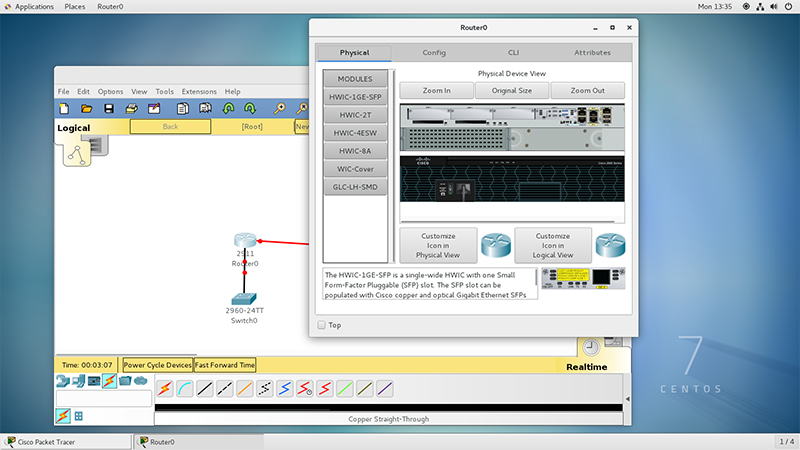
With packet tracer working you might think your work is done. Not yet, it helps to add Packet Tracer to the Application Menu in Gnome. You can also associate packet tracer files with the application so that you can double-click on the save files and launch the application.
As root, using your favorite editor (there’s a huge vi vs nano divide in the networks team) create /usr/share/applications/pt.desktop and paste the following into it:
[Desktop Entry] Exec=/opt/pt/bin/PacketTracer7 Icon=/opt/pt/art/app.png Type=Application Terminal=false Name=Packet Tracer 7.11 MimeType=application/x-pka;application/x-pkt;application/x-pkz;
Run:
sudo update-desktop-database /usr/share/applications
This will reload your Applications menu and add PT to it.
Again as root using your favorite editor create /usr/share/mime/packages/pt.xml and paste:
<?xml version="1.0" encoding="utf-8"?> <mime-info xmlns="http://www.freedesktop.org/standards/shared-mime-info"> <mime-type type="application/x-pka"> <comment>Packet Tracer Activity</comment> <glob pattern="*.pka"/> </mime-type> <mime-type type="application/x-pkt"> <comment>Packet Tracer</comment> <glob pattern="*.pkt"/> </mime-type> <mime-type type="application/x-pkz"> <comment>Packet Tracer Archive</comment> <glob pattern="*.pkz"/> </mime-type> </mime-info>
You may need to adapt the next bit if you use a different desktop theme from the default.
sudo bash cd /usr/share/icons/Adwaita/32x32/mimetypes cp /opt/pt/art/pka.png application-x-pka.png cp /opt/pt/art/pkt.png application-x-pkt.png cp /opt/pt/art/pkz.png application-x-pkz.png gtk-update-icon-cache /usr/share/icons/Adwaita/ update-mime-database /usr/share/mime/packages
If you save a packet tracer file in your workspace now, it should show with a packet tracer icon in your file manager tool. Double-click and the application should launch.
A topic of discussion at the WCIT awards ceremony on the 22nd of February was the lack of women entering the profession. According to the Guardian in 2017 only 16% of those applying to study Computer Science and related degrees are women.

Ada Lovelace
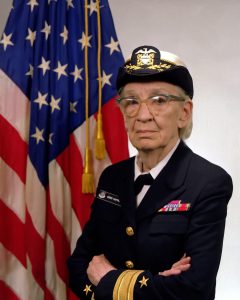
Grace M. Hopper
The three women I mentioned above are fairly widely know in Computing. There are many other leading women who are not well known. There are some interesting projects going on to try to fix this. The Notable Women in Tech Cards is a project to feature women who have made important contributions to computer science, networking, software and other fields on a set of playing cards. Grace Hopper is the Queen of Spades in the deck. Ada Lovelace isn’t on the list, but the ADA programming language is named after her.
There is a larger related project to publish and expand the number of Wikipedia pages dealing with notable women in IT. The project is organised by CRA-W and the Anita Borg institute. This is a nicely geeky way to address the issue of the lack of visibility for women in Tech.
The School of Creative Technologies would like to congratulate our student Gareth Weston on winning an Outstanding Information Technology Student Award from the Worshipful Company of Information Technologists. Gareth was among five winners of the award in a ceremony held at the historic 19th century Armourers’ Hall in the City of London on Wednesday 22nd February.
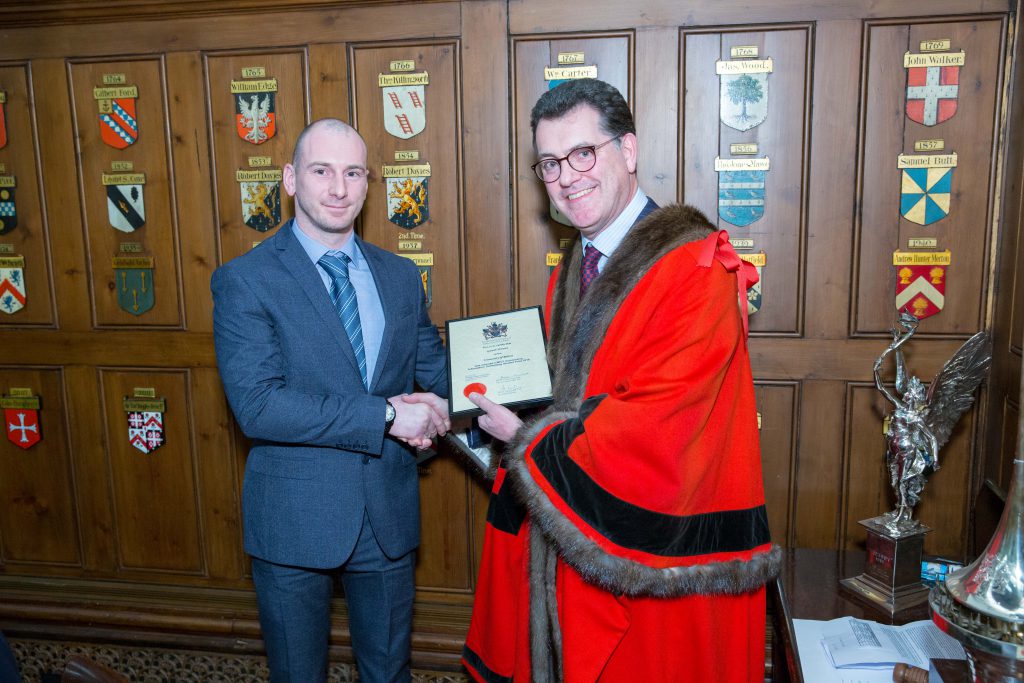
City of London Alderman Vincent Keaveny presenting Gareth with his award (photo courtesy of Gerald Sharp Photography sharpphoto.co.uk)
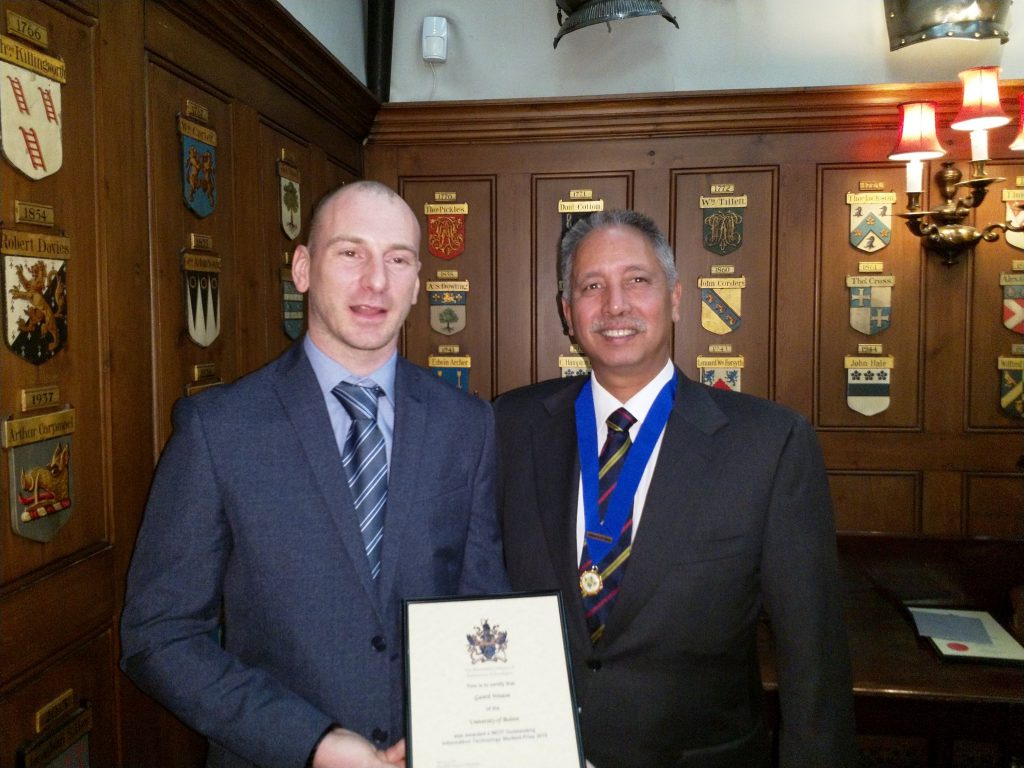
© 2024 UoB Computing
Theme by Anders Norén — Up ↑